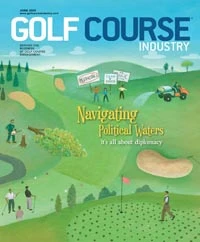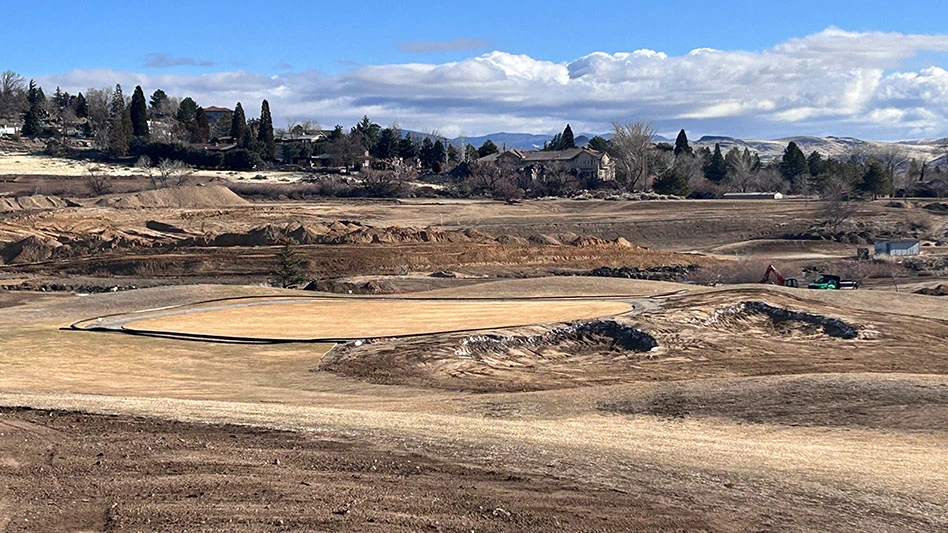It’s been almost 25 years since I graduated from the University of Kansas with a sheepskin in journalism and a nearly useless degree in liberal arts and sciences. I’m a proud Jayhawk. Yes, I went bananas when they won March Madness several months ago. And I feel like I received an excellent education from top-notch instructors.
Yet, I can honestly say that in the quarter century since my matriculation, I never once contacted any of my former professors for help or advice. It’s too late to pick up that habit now because most of those folks are dead or retired. It was probably stupid of me not to take advantage of the incredible mind power, experience and wisdom they could’ve offered, but I’m fairly typical of graduates in most disciplines. Most, that is, except the discipline of turf management.
There seems to be an almost unbreakable bond between superintendents and other turf managers and their college instructors. There’s something unique and lasting about this phenomenon that’s different from the typical student-teacher relationship. I’ve been marveling at this for 20-plus years now and have developed a few conclusions and observations.
Change is a constant. The technologies, techniques and some basic premises of golf course maintenance, unlike journalism and many other industries, have changed drastically in two decades. Cadmium and mercury have been replaced by low-dose active ingredients; foliars have become part of maintenance vocabulary; turfgrasses have been engineered by the dozens. What’s more, we’ve literally reinvented the business in terms of environmentalism. Without that constant contact with the scientists who test and review the endless stream of new products or provide the gentle guidance needed to adapt to new practices, every superintendent would be working with one hand tied behind his back.
Putting value on validation. It’s ingrained in most superintendents not to try or buy a product until their “Doc” has checked it out back at State U. Proving a product through basic independent research is almost like getting a high school diploma – it’s a line of demarcation that has to be crossed before you can even be considered for a job. This is a risk-averse business. Failure isn’t an option when it comes to the care of a multimillion-dollar property. Thinking something works isn’t enough – you have to know. Our academic partners are worth their weight in gold for that reason alone.
Chapter relationships. Throughout the years, there has been a close and mutually beneficial relationship between local superintendent chapters and nearby universities. Chapters fund research projects and provide sites for studies to be done under real-world conditions. In return, professors “donate” time and expertise to the chapters and their members. The same professors speak frequently at local meetings and are often unpaid (or at least underpaid) consultants for their former students.
It’s a small world. By most accounts, golf course maintenance is a $9-billion annual industry. Yet, for such a large business, it’s a small community that tends to stick together. The relationship developed with that leading instructor as an undergrad seems to last, more often than not, because of constant contact and, usually, proximity. In short, most apples don’t fall far from the tree, and that teacher is still close by and still the area’s preeminent expert on all things turfy.
All agronomy is local. I’m always amazed at how different the agronomic programs at two courses just a few miles away from each other can be. No one knows the soils, microclimates and other vagaries of a course better than its superintendent; but usually no one knows the big-picture factors within a state or region better than the local research folks. You can bring in a brilliant consultant from another part of the country and chances are good they won’t understand all the little stuff that adds up to agronomic success as well as the local university professional.
Band of brothers. At the risk of being sexist, golf course maintenance is like a fraternity. The common bond among the membership is mostly a sense of perfectionism, a high level of personal integrity, love for the outdoors and a common sense of frustration that golfers just don’t get it. If superintendents are a band of brothers, researchers are the wise old uncles who keep them on the straight and narrow, remind them of important family history and occasionally take them out for beers. Wait, scratch that last part. You should always buy the drinks for your wise old uncles … and reporters.
Shared values. As hard as most superintendents work, I wonder if many in the university community don’t put in as many hours, blood, sweat and tears to their work. So many professors I know are overachievers who have to balance time in the lab, teaching, speaking, consulting and traveling all over the globe to keep up with the science. It’s amazing how often I cross paths in some remote location with Karl Danneberger, Joe Vargas, Bruce Clarke or Fred Yelverton. Like superintendents, their commitment to their profession keeps them away from home and continually looking to learn new things.
The bottom line is that the tight-knit symbiotic relationship between turf professionals and their university partners is one of the most important, yet often overlooked, keys to the success and growth of our industry. We’re lucky to have it. So, make sure to take time to thank those who have taught you so well. I wish I had. GCI
Pat Jones is president of Flagstick LLC, a consulting firm that provides sales and marketing intelligence to green industry businesses. He can be reached at psjhawk@cox.net or 440-478-4763.

Explore the June 2008 Issue
Check out more from this issue and find your next story to read.
Latest from Golf Course Industry
- The Cabot Collection announces move into course management
- Carolinas GCSA raises nearly $300,000 for research
- Advanced Turf Solutions’ Scott Lund expands role
- South Carolina’s Tidewater Golf Club completes renovation project
- SePRO to host webinar on plant growth regulators
- Turfco introduces riding applicator
- From the publisher’s pen: The golf guilt trip
- Bob Farren lands Carolinas GCSA highest honor







